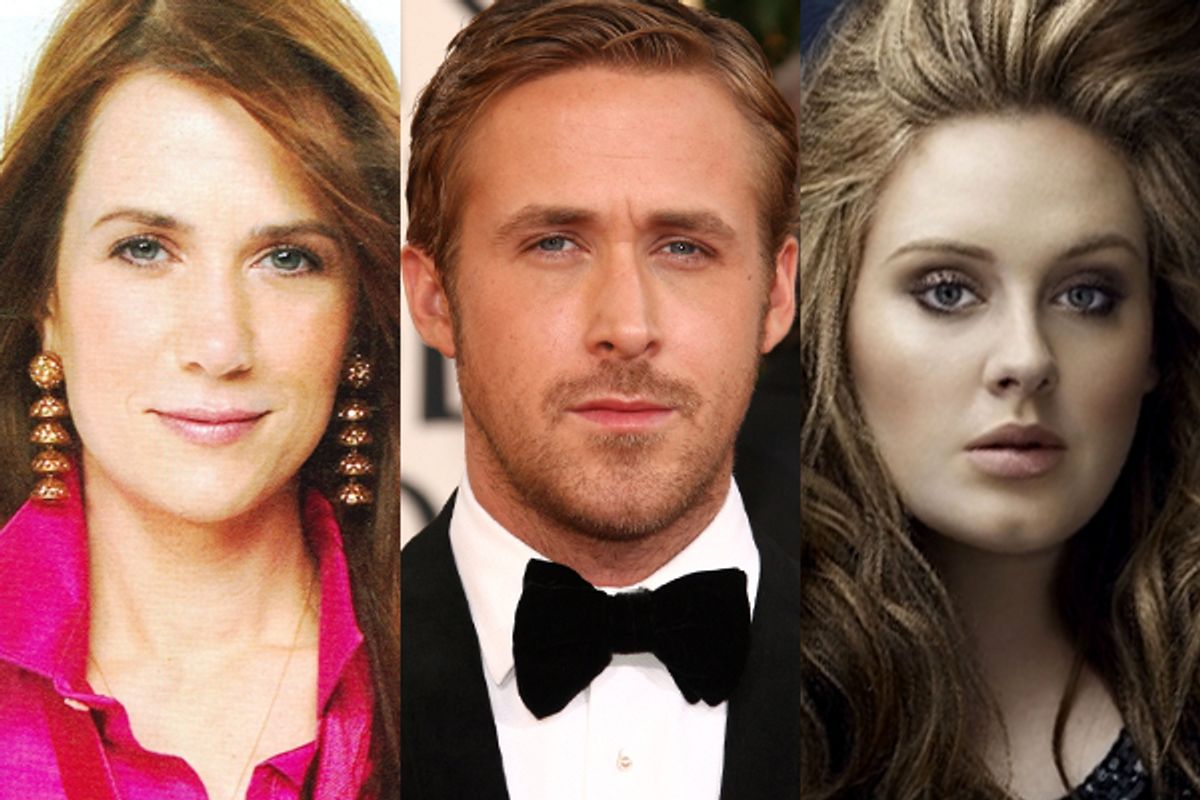Adele Laurie Blue Adkins is an unusual pop icon for 2011. Of course, she styles herself as a pop icon circa 1968, invoking the lacquered hairdos and modestly glamorous attire of Dusty Springfield or Jackie DeShannon, but it wasn’t Adele’s retro fashion sense that distinguished her this year, especially as the vogue for soul revival is quickly fading. Not only does she not have the conventional body type for a pop star, but she has been wholly unapologetic about it: “I make music to be a musician, not to be on the cover of Playboy,” she told the Mirror back in 2008, and she hasn’t relented. Nor does she dance or work with popular producers or invite rappers to provide the bridge for her next single.
Adele bucked every current trend in the music industry, including -- and especially -- lackluster album sales. Her second full-length, "21" (which, like its predecessor, "19," was named for her age when she wrote the songs), spent a truly remarkable 13 weeks at the top of the Billboard album charts. Every other week of the year, it was in the top 10, if not the top five. Still is, in fact. A live album/DVD chronicling a gregariously foul-mouthed performance at the Royal Albert Hall in London was released around the time music publications on both sides of the Atlantic were putting her at the top of their lists for artist of the year, album of the year, song of the year — or all three. “Saturday Night Live” even wrote an entire sketch about how no one can hear “Someone Like You” without bawling. And hey, it was actually funny!
More than any other musician in 2011, more than Lady Gaga or Bon Iver or Katy Perry or Kanye West, Adele effortlessly bridged disparate markets and audiences, almost without trying. Pop fans, AOR listeners, indie rock kids, your mother -- all appreciated the wounded defiance of “Rolling in the Deep” and the sharp acrimony of “Rumour Has It.” Everyone, it seems, can identify and empathize with her pain, which speaks to her power as both a songwriter and a vocalist. Adele manages to strike the perfect balance between specific and universal sentiments, so that almost every song sounds like it originated in her own experience but could easily apply to those who haven’t lived through it. And she sang about it all with restraint and nuance, which is difficult for anyone with a powerful voice. Pop rewards loud fireworks; Adele gave us quiet explosions.
Because of the style of music she associates herself with, many fans and writers have positioned her as the anti-Lady Gaga, an “authentic” pop artist rather than a “plastic” celebrity. It’s a useless comparison, and not merely because it upholds certain tired boomer concepts about what is “real” and “good” in pop music and what is “artificial” and “bad.” What is much more instructive: Lady Gaga was everywhere in 2011, while Adele was sidelined with health issues for most of the year. Ubiquity is built into Gaga’s whole concept (her first album, after all, was titled "The Fame"), yet she had to scrimp to move 1 million copies of her second album, "Born This Way," and the $3.99 markdowns and free giveaways appeared increasingly desperate. Adele, on the other hand, scrapped a major tour and had throat surgery for a hemorrhaged vocal cord this fall. As a result, she wasn’t able to play very many live shows, and her public appearances were kept to a minimum. Even the tabloids — at least in America, but who knows what goes down in the U.K.? — kept their distance.
Perhaps that limited visibility is part of Adele’s appeal, complementing and even reinforcing her vocal and lyrical talent. The Internet has long made it possible to track celebrities 24/7, to be inundated with every last detail of the Kardashian clan or Britney Spears’ engagement. Adele may not have actively shunned the spotlight, but she was surprisingly reserved for someone who was selling albums like it was 1984. As a result, she retained some of her mystery (at least for American audiences), so we never got a chance to get sick of her. It recalled a pre-Internet era when fans had to pursue their favorite stars, had to go well out of their way to keep up with the latest details. Adele is an analog pop star in a digital world.
That ties in with the throwback musical styles Adele is working with and reshaping, but it is no judgment on the music itself. "21" is good not because it carries the weight of so much pop history, but because it carries the weight of so much pop history so gracefully. While many musicians embrace and revive old genres and trends, few have Adele’s pipes, her insightful lyrical chops, or her poise. Inhabiting her songs confidently, even fearlessly, Adele set a new standard for dignity in the face of heartache. She struggles to hold back tears rather than giving in to the urge to sob; she displays compassion instead of contempt, whether it’s for a man who broke her heart or for the woman he broke her heart with. Adele is, in other words, the woman we all wish we could be, soulful and spirited and strong.

Shares